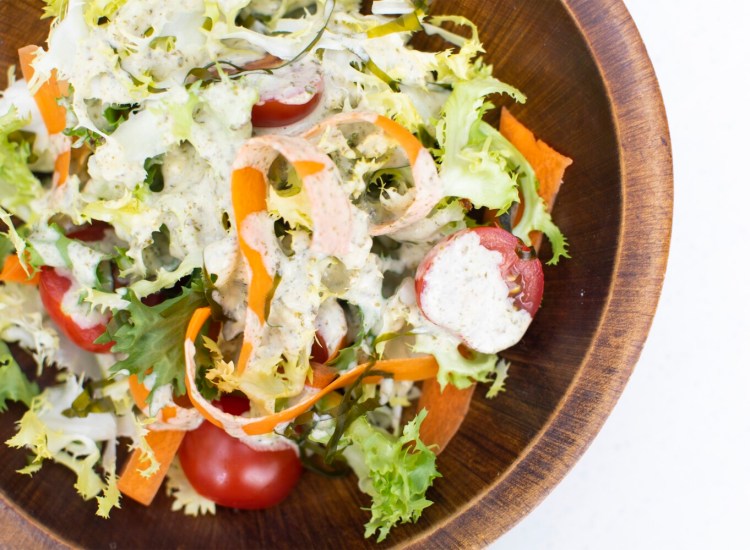Last December, we reluctantly said goodbye to a towering evergreen tree in our yard. It was dying, leaning dangerously toward the garage. The arborist left the base of the trunk standing at about 4 feet high so I could place a flowerpot on the makeshift stand until decomposition deems it too weak.
But in this era of social distancing, this flat surface, with its 50-plus growth rings, serves as the spot where we tell neighbors, friends and delivery people to pick up or drop off bags of gifts, and borrowed and purchased items. We jokingly call it the “Dump Stump.” But my mood grows sober when I think about how local food suppliers have had to pivot hard to keep their operations afloat and their customers fed as the pandemic presses on. Masked, on-farm exchanges; parking lot rendezvous; curbside pick-ups; uncrowded (by design) farmers markets; or home delivery services were certainly not the norm six weeks ago.
Briana Warner, CEO of Saco-based Atlantic Sea Farms, is no stranger to the hard pivot. She was a diplomat working in West Africa before she opened her acclaimed Maine Line Pie in Portland in 2013. She shuttered the bakery a year later to take a job as an economic development officer with the Island Institute in Rockland, working to revitalize working waterfronts. Two years ago, she took over Atlantic Sea Farms, where she is expanding the company’s product line of value-added kelp products, increasing its presence in food service operations, and growing its cadre of kelp farmers.
When I phoned Warner to interview her, she had to be pulled off the processing line to take the call. Kelp harvesting season started on April 1. Warner could not hire her usual temp workers because they would have had to travel together to Atlantic Sea Farms’ facility in a van. Therefore, the company’s four salaried employees stood appropriately distanced on the production line washing, shredding and blanching the hundreds of thousands of pounds of kelp their two dozen partner farmers had begun to pull out of Gulf of Maine waters.
“There was never a question whether or not our farmers were going to get paid,” Warner said.
Growing kelp is not easy work, Warner explains, because it requires hauling in lines heavy with mature seaweed. But since Atlantic Sea Farms both supplies the seed (incubated in the company’s nursery in Saco) and guarantees a market buy-in, it’s attractive to many fishermen and lobstermen as a way to diversify their income in the face of challenges like trade wars, right whale protections, and climate change.
Lobsterman Justin Papkee started growing kelp for Atlantic Sea Farms in Casco Bay two and a half years ago after taking an aquaculture business development course at the Island Institute. The course introduced him to oyster, mussels and kelp farming. He pursued kelp in part because the harvest season dovetails nicely into his downtime as a lobsterman. Papkee uses somewhat frayed line no longer suitable for lobstering to grow his kelp – off Long Island where he lives – because its texture gives the kelp seed something to latch onto. “The challenge is doing the tango with mother nature so the kelp thrives until you can harvest it,” Papkee said. “But then again, as a fishermen, you’re kind of already used to that two-step.”
Atlantic Sea Farms doesn’t sell raw kelp because “if kelp doesn’t taste good, people aren’t going to eat it,” Warner said. Instead, it sells ready-to-eat blanched, shredded kelp that can be tossed into any dish; and pureed kelp cubes, good for smoothies but also handy for sauces, baked goods and salad dressings. Its fermented seaweed salad is a preservative-free alternative to imported Japanese products; its Sea-Chi is a sea-based take on kimchi; and I can attest that its Sea-Beat Kraut makes a great addition to a Rueben sandwich.
While the company’s products are sold in health food stores in Maine and bigger grocery stores throughout New England, Warner says 50 percent of its sales last year were to food service operations now closed because of the pandemic. Hence it has switched to boosting retail and online sales, including a free shipping offer to customers in New England through the end of May.
As we consumers of local fare figure out new ways to procure quality Maine-produced food, it’s a good time to add more Maine seaweed to our tables. It’s sustainable, helps maintain Maine’s working waterfront roots, and you can get it delivered right to your door for free.
Christine Burns Rudalevige is a food writer, a recipe developer and tester, and a cooking teacher in Brunswick. Contact her at: cburn1227@gmail.com.

Columnist Christine Burns Rudalevige makes salad dressing that calls for kelp cubes from Atlantic Sea Farms. Brianna Soukup/Staff Photographer
Maine Seaweed and Tahini Salad Dressing
Atlantic Sea Farms CEO Briana Warner rattled off the ingredients for this vegan Ceasar-like salad dressing during a recent conversation. I had to make an educated guess about the proportions – the results are delicious. I make this on the thicker side when I want to use it as a dip for anything from pretzel rods to carrot sticks. When I want to use it as a standard salad dressing, I thin it out with a bit of warm water.
Makes 1 cup
2 cubes Atlantic Sea Farms kelp
1 garlic clove
1/4 cup tahini
Zest and juice of 1 lemon
2 tablespoons olive oil
1 tablespoon maple syrup
Salt
Place all ingredients in a blender but for the salt and process until you get a smooth, thick dressing. Thin with warm water to your desired consistency and season with salt to taste.
Send questions/comments to the editors.



Comments are no longer available on this story